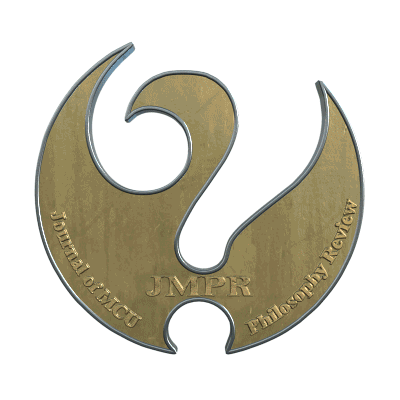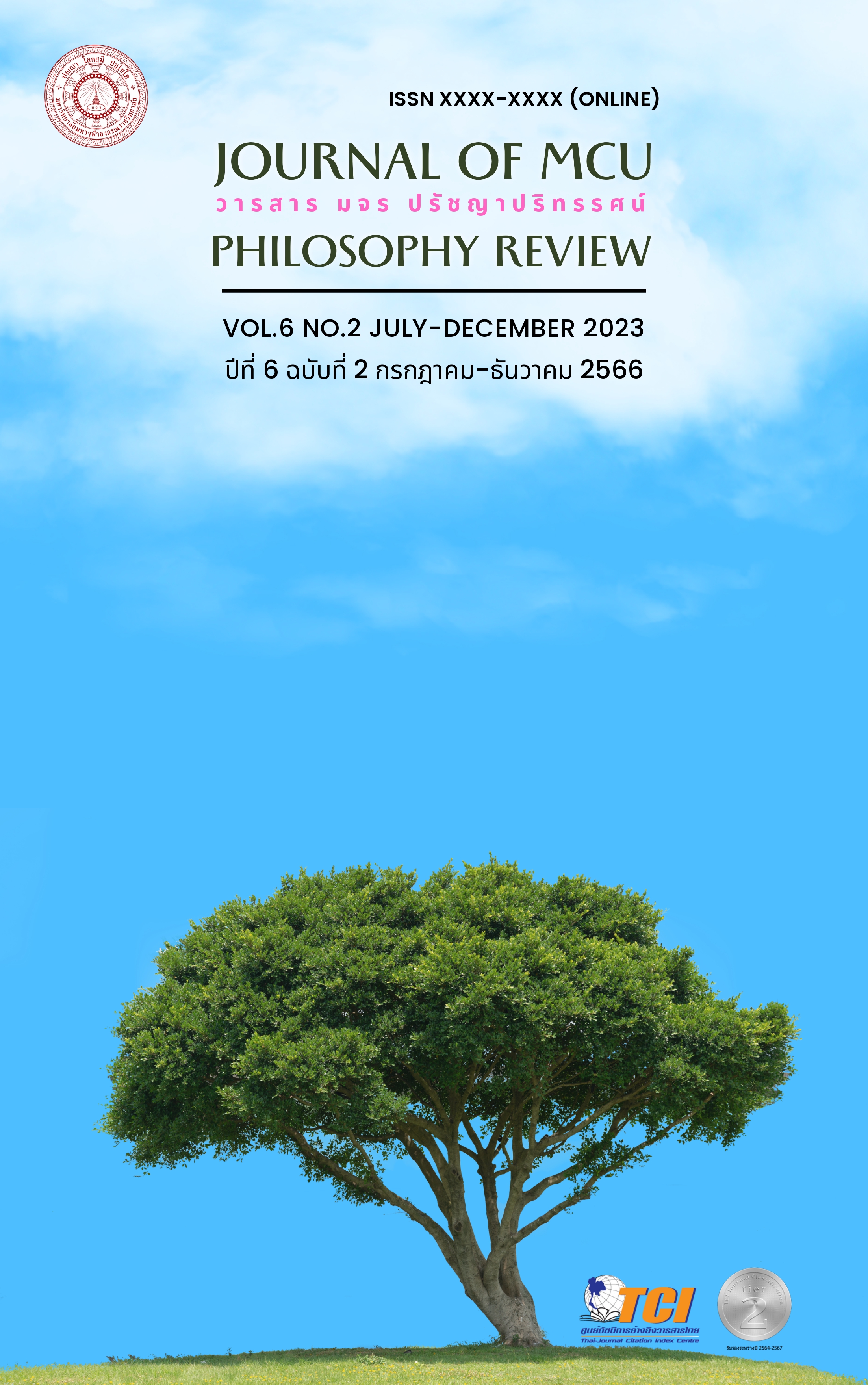ภาวะผู้นำของผู้บริหารที่ส่งผลต่อประสิทธิภาพการปฏิบัติงาน ของบุคลากรมหาวิทยาลัยมหามกุฏราชวิทยาลัย
Main Article Content
บทคัดย่อ
บทความวิจัยนี้มีวัตถุประสงค์เพื่อ 1) ศึกษาภาวะผู้นำของผู้บริหาร มหาวิทยาลัยมหามกุฏราชวิทยาลัย 2) ศึกษาประสิทธิภาพการปฏิบัติงานของบุคลากร มหาวิทยาลัยมหามกุฏราชวิทยาลัย และ 3) ศึกษาภาวะผู้นำของผู้บริหารที่ส่งผลต่อประสิทธิภาพการปฏิบัติงานของบุคลากร มหาวิทยาลัยมหามกุฏราชวิทยาลัย วิธีดำเนินการวิจัย เป็นการวิจัยเชิงพรรณนา ผลการวิจัยพบว่า 1. ภาวะผู้นำของผู้บริหาร โดยภาพรวมอยู่ในระดับมาก และรายด้านอยู่ในระดับมากทุกด้าน เรียงจากมากไปหาน้อย ดังนี้ การแสดงเป็นแบบฉบับให้บุคลากรเป็นผู้นำตนเอง การสร้างรูปแบบความคิดในทางบวก การทำให้บุคลากรเป็นผู้นำตนเอง การกระตุ้นให้บุคลากรตั้งเป้าหมายด้วยตนเอง การสนับสนุนให้เกิดภาวะผู้นำตนเองโดยการสร้างทีมทำงาน การอำนวยความสะดวกให้เกิดวัฒนธรรมของผู้นำตนเอง และการอำนวยความสะดวกให้เกิดภาวะผู้นำตนเอง โดยให้รางวัลและการตำหนิทางสร้างสรรค์ ตามลำดับ 2. ประสิทธิภาพการปฏิบัติงานของบุคลากร โดยภาพรวมอยู่ในระดับมาก เมื่อพิจารณาเป็นรายด้านอยู่ระดับมากทุกด้าน เรียงจากมากไปหาน้อย ดังนี้ การทำงานเป็นทีม การยึดมั่นในความถูกตองชอบธรรมและจริยธรรม การสั่งสมความเชี่ยวชาญในงานอาชีพ การมุ่งผลสัมฤทธิ์ และการบริการที่ดี ตามลำดับ 3. ภาวะผู้นำของผู้บริหารส่งผลต่อประสิทธิภาพการปฏิบัติงานของบุคลากรมหาวิทยาลัยมหามกุฏราชวิทยาลัย โดยการสร้างรูปแบบความคิดในทางบวก การอำนวยความสะดวกให้เกิดวัฒนธรรมของผู้นำตนเองส่งผลต่อประสิทธิภาพการปฏิบัติงานของบุคลากร มหาวิทยาลัยมหามกุฏราชวิทยาลัย อย่างมีนัยสำคัญทางสถิติที่ระดับ .01 และ การอำนวยความสะดวกให้เกิดภาวะผู้นำตนเอง โดยให้รางวัลและการตำหนิทางสร้างสรรค์ ส่งผลต่อประสิทธิภาพการปฏิบัติงานของบุคลากร มหาวิทยาลัยมหามกุฏราชวิทยาลัย อย่างมีนัยสำคัญทางสถิติที่ระดับ .05 สามารถทำนายประสิทธิภาพการปฏิบัติงานของบุคลากร มหาวิทยาลัยมหามกุฏราชวิทยาลัย โดยภาพรวม ได้ร้อยละ 72.9 ค่าประสิทธิภาพในการทำนายที่ปรับแล้ว เท่ากับ .724 และมีความคลาดเคลื่อนมาตรฐานในการทำนาย เท่ากับ .295 สามารถเขียนแสดงความสัมพันธ์ ในรูปของสมการพยากรณ์คะแนนดิบ และคะแนนมาตรฐาน ได้ดังนี้
= 1.091** + .376**(X4) + .197**(X7) + .173*(X5)
= .452**(ZX4) + .260**(ZX7) + .205*(ZX5).
Article Details

อนุญาตภายใต้เงื่อนไข Creative Commons Attribution-NonCommercial-NoDerivatives 4.0 International License.
บทความที่ได้รับการตีพิมพ์เป็นลิขสิทธิ์ของวารสาร มจร ปรัชญาปริทรรศน์
ข้อความในบทความที่ได้รับการตีพิมพ์ในวารสาร ถือเป็นความรับผิดชอบของผู้เขียนบทความ และข้อคิดเห็นนั้นไม่ถือว่าเป็นทัศนะและความรับผิดชอบของกองบรรณาธิการวารสาร มจร ปรัชญาปริทรรศน์
เอกสารอ้างอิง
นฤมล สุวรรณรงค์. (2564). ภาวะผู้นำของผู้บริหารที่ส่งผลต่อประสิทธิผลการบริหารงานในโรงเรียนพระปริยัติธรรมแผนกสามัญศึกษา กลุ่มที่ 8 สังกัดสำนักงานพระพุทธศาสนาแห่งชาติ. ครุศาสตรมหาบัณฑิต สาขาวิชาการบริหารการศึกษา. บัณฑิตวิทยาลัย: มหาวิทยาลัยราชภัฎสกลนคร.
ปณิลิน จันภักดี. (2565). ภาวะผู้นำเหนือผู้นำของผู้บริหารกับประสิทธิผลของสถานศึกษา สังกัดสำนักงานเขตพื้นที่ารศึกษาประถมศึกษาราชบุรี เขต 2. ศึกษาศาสตรมหาบัณฑิต สาขาวิชาการบริหารการศึกษา. บัณฑิตวิทยาลัย: มหาวิทยาลัยศิลปากร.
พรสวัสดิ์ ศิรศาตนันท์. (2555). ภาวะผู้นำทางการศึกษา. จันทบุรี: มหาวิทยาลัยราชภัฎรำไพพรรณี.
พร้อมกูรณ์ อนิสสิต. (2557). อิทธิพลภาวะผู้นำเหนือผู้นำของผู้บริหารสถานศึกษาที่ส่งผลต่อคุณภาพผู้เรียนของโรงเรียน ในสังกัดสำนักงานเขตพื้นที่การศึกษามัธยมศึกษา เขต 18. วิทยานิพนธ์การศึกษามหาบัณฑิตสาขาวิชาการบริหารการศึกษา. คณะศึกษาศาสตร์: มหาวิทยาลัยบูรพา.
พระมหาคณาธิป จันทร์สง่า. (2561). ปัจจัยที่ส่งผลต่อประสิทธิภาพการปฏิบัติงานของข้าราชการ สำนักงานเขตสัมพันธวงศ์ กรุงเทพมหานคร. สารนิพนธ์ รัฐประศาสนศาสตรมหาบัณฑิต สาขารัฐประศาสนศาสตร์. บัณฑิตวิทยาลัย: มหาวิทยาลัยสยาม.
พิษณุ กิตติพงศ์วรการ. (2563). ศึกษาเรื่อง ปัจจัยที่ส่งผลต่อประสิทธิภาพการทำงานของพนักงานรัฐวิสาหกิจแห่งหนึ่ง. หลักสูตรบริหารธุรกิจมหาบัณฑิต สาขาวิชาการจัดการคณะบริหารธุรกิจเพื่อสังคม. บัณฑิตวิทยาลัย: มหาวิทยาลัยศรีนครินทรวิโรฒ.
มหาวิทยาลัยมหามกุฏราชวิทยาลัย. (2556). แผนกลยุทธ์มหาวิทยาลัยมหามกุฏราชวิทยาลัยระยะ 10 ปี (พ.ศ. 2556 – 2565). กองนโยบายและแผน มหาวิทยาลัยมหามกุฏราชวิทยาลัย.
มหาวิทยาลัยมหามกุฏราชวิทยาลัย. (2564). แผนปฏิบัติราชการประจำปีงบประมาณ พ.ศ. 2564. กองนโยบายและแผน มหาวิทยาลัยมหามกุฏราชวิทยาลัย.
มหาวิทยาลัยมหามกุฏราชวิทยาลัย. (2565). แผนปฏิบัติราชการประจำปีงบประมาณ พ.ศ. 2565. กองนโยบายและแผน มหาวิทยาลัยมหามกุฏราชวิทยาลัย.
ศศิธร สุขสิงคลี. (2562). พฤติกรรมภาวะผู้นำที่มีผลต่อคุณภาพการทำงานของบุคลากรทางการศึกษาในสถานศึกษาเอกชนจังหวัดเชียงใหม่. วารสารวิชาการมหาวิทยาลัยราชภัฏอุดรธานี. 7 (2), หน้า 59-78.
ศิริพร นาทันริ, ราเชนทร์ นพณัฐวงศกร และ วิเชียร วิทยอุดม. (2561). ภาวะผู้นำที่ส่งผลต่อประสิทธิผลในการปฏิบัติงานของบุคลากรสำนักงานเขตหนองแขม กรุงเทพมหานคร.
วิทยานิพนธ์รัฐประศาสนศาสตร มหาบัณฑิต. บัณฑิตวิทยาลัย: มหาวิทยาลัยเอเชียอาคเนย์.
สัมมา รธนิดย์. (2556). ภาวะผู้นำของผู้บริหาร. กรุงเทพฯ: ข้าวฟ่าง.
สำนักงานคณะกรรมการการอุดมศึกษา. (2556). แผนพัฒนาการศึกษาระดับอุดมศึกษา ฉบับที่ 11 (พ.ศ. 2555- 2559). บทสรุปผู้บริหาร.
สำนักงานคณะกรรมการข้าราชการพลเรือน (สำนักงาน ก.พ.). (2553). คู่มือการกำหนดสมรรถนะในราชการพลเรือน : คู่มือสมรรถนะหลัก. นนทบุรี: บริษัทประชุมช่างจํากัด.
เสาวรส ประเทืองชัยศรี. (2552). ความสัมพันธ์ระหว่างภาวะผู้นำแบบอย่างของหัวหน้างานการพยาบาลกับความสุขในการทำงานของพยาบาลวิชาชีพโรงพยาบาลชุมชนเขต 13.
วิทยานิพนธ์พยาบาลศาสตรมหาบัณฑิต สาขาวิชาการบริหารการพยาบาล. บัณฑิตวิทยาลัย: มหาวิทยาลัยสุโขทัยธรรมาธิราช.
องอาจ นัยพัฒน์. (2558). การประเมินผลการปฏิบัติงานของบุคลากรในสถาบันอุดมศึกษา : กรอบแนวคิดและแนวทางปฏิบัติเพื่อการพัฒนา. วารสารการวัดผลการศึกษา มหาวิทยาลัยมหาสารคาม.21(1), หน้า 101-112.
Best W. John. (1997). Research in Education. Boston MA.: Allyn and Bacon.
Dubrin, A. J. (1998). Leadership: Research Finding, Practice and Skills. Boston: Houghton Muffling.
Krejcie, R. V. & Morgan, D. W. (1970). Determining Sample Size for Research Activating. Journal of Education and Psychological Measurement, 3(3), pp.607-610.
Manz, C. C., & Sims, H. P. (1991). The new super-leadership other to lead the selves. Sanfrancisco: Berreit-Koehler.


